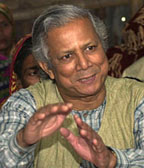Banking for the poor
 Muhammad Yunus’s banking plan is simple enough.
Muhammad Yunus’s banking plan is simple enough.
“I just have to look at what the conventional banks are doing and do the opposite.”
Yunus founded Grameen Bank in Bangladesh 31 years ago. He pioneered the idea of microcredit, and he and his bank were awarded a Nobel Peace Prize in 2006 for their efforts. Yunus spoke at the Bagdad Theater in Portland on Sunday, part of a tour for his new book, “Creating a World Without Poverty.” Yunus believes, “because poverty is artificially imposed on society, it can be removed.”
When Yunus returned to his homeland from America, where he earned a PhD at Vanderbilt, he wanted to change the conventions of business and banking. It began in 1976 with loans to 42 people, which all together totaled $27. The bank’s mission led to a program that lent money to beggars.
“We asked them, ‘as you go to houses, would you like to offer them toys for their kids, or merchandise?’” he said. Grameen Bank gave the loans without any interest or time limits. The only stipulation was if the beggar could pay off the first loan, then he or she would be eligible for a second loan.
There are now 100,000 beggars in the program. The average loan is $12. Ten thousand have quit begging altogether, while the rest are now just part-time beggars, Yunus said.
“They are in the process of closing down their begging division,” he said. “All we gave them was money and the idea … all humans have entrepreneurial abilities.”
Grameen Bank expanded its microcredit banking formula over the years by giving small loans to the neediest citizens. An average loan now is $150; the bank has 7.5 million borrowers. The bank is a non-dividend company and never uses lawyers in its transactions. Also noteworthy is the fact that 97 percent of its borrowers are women. Yunus said that women in Bangladesh, a predominately Islamic nation, knew little, if anything, about money. As Grameen Bank continued to teach women and lend them money, it found that “the money going to women was being used better than money to men,” Yunus said. The bank then focused its business on lending to women.
The subtitle to Yunus’s new book is, “Social Business and the Future of Capitalism.” From the book:
To make the structure of capitalism complete, we need to introduce another kind of business – one that recognizes the multidimensional nature of human beings. If we describe our existing companies as profit-maximizing businesses (PMBs), the new kind of business might be called social business. Entrepreneurs will set up social businesses not to achieve limited personal gain but to pursue specific social goals.
To free-market fundamentalists, this might seem blasphemous. The idea of a business with objectives other than profit has no place in their existing theology of capitalism. Yet surely no harm will be done to the free market if not all businesses are PMBs. Surely capitalism is amenable to improvements. And surely the stakes are too high to go on the way we have been going. By insisting that all businesses, by definition, must necessarily be PMBs and by treating this as some kind of axiomatic truth, we have created a world that ignores the multidimensional nature of human beings. As a result, businesses remain incapable of addressing many of our most pressing social problems. …
A social business is not a charity. It is a business in every sense. It has to recover its full costs while achieving its social objective. When you are running a business, you think differently and work differently than when you are running a charity. And this makes all the difference in defining social business and its impact on society.
Yunus said he is not against PMBs altogether, “I’m saying that (social business) is an option.”
As someone who dislikes Bono so much, I am drawn to Yunus’s belief that charity is not the answer to world poverty. People, especially students at this university, often believe being a pure capitalist means being inhumanly greedy. Yunus has proved this argument false for several decades. It goes back to the old saying, “give a man a fish, feed him for a day, teach a man to fish, feed him for a lifetime.” It promotes self-sustaining citizens and can somewhat stabilize erratic economies.
Yunus is forthright with his beliefs and quite moderate when it comes to looking that the world’s institutions and understanding the roles of governments and private sectors in societies. I don’t find his thinking too revolutionary, I guess I always thought the idea of capitalism was to better society (silly me), but the way he has put those beliefs to practice is admirable. He is also a humble speaker to listen to and projects a charming personality. Check out this interview from the Colbert Report.



The problem with the grameen bank is that it is highly politicized and received many subsidies, thereby making it not a business or bank, but a welfare office.
Here’s a story detailing its shortcomings,
http://www.mises.org/story/2375
Does your bank make you go though the ’16 decisions?’
http://www.grameen-info.org/bank/the16.html
The purpose of any business is to maximize shareholder value, but there are such things as non-monetary sources of utility. Having done some work recently with a local charity (mostly because my girlfriend is in the process of trying to revamp the PR/fundraising for it), I can say that he’s exactly right about the difference in attitude with charities and business.